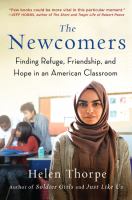The Newcomers: Finding Refuge, Friendship, and Hope in an American Classroom by Helen Thorpe
The refugees arrive with nothing, not even the language, having escaped violence, poverty, unspeakable loss. Their destination is Denver, Colorado. There they will land in a classroom helmed by Eddie Williams, the teacher tasked with orienting refugees from around the globe to their new home in the United States.
Mr. Williams will teach English, yes, but also survival skills that are critical to transition. This is the Newcomers class, a Denver Public Schools program designed to support refugee students with educational gaps brought on, most frequently, by war.
To better understand what these students go through, journalist Helen Thorpe embedded in South High School for more than a year. She documents her process in her book The Newcomers: Finding Refuge, Friendship and Hope in an American Classroom. While many journalists absent themselves from the story, Thorpe interacts freely with students, allowing her to gain their trust and, for some, their friendship. It’s a technique that makes the book incredibly moving and intensely personal.
In Room 142, nothing is easy. The newcomers must learn classroom rules, cultural context, how to structure a sentence and where to find lunch—all from teachers who don’t share their language. Among the 22 students who join the class are Solomon and Methusella, brothers from the Democratic Republic of Congo devoted to their studies; bubbly Lisbeth from El Salvador, whose antics transform the classroom; quiet Hsar Htoo from Burma, for whom English is a particular challenge; and Jakleen and Mariam, Iraqi sisters whose traumatic past makes life in Denver almost unbearable.
The newcomers themselves are central here, but Thorpe also highlights the role of school staff and aid workers in setting students up for success. When possible, teachers connect new students to mentors, other students who have themselves transitioned to mainstream classrooms. The goal is to give learners something to strive for, and it works—newcomers go on to become involved in student government, athletics and other activities. But first they must overcome the challenges of assimilating to a strange new life.
The hurdles refugees face are unimaginable to most of us. After navigating the complex, years-long process of getting approval to resettle in the United States, families must secure housing and employment, navigate an unfamiliar city, learn to manage their finances and meet all of their legal obligations. Everything is bewildering, a minefield of cultural contradictions made more so by anti-immigrant sentiments that bubbled up during the 2016 election season.
That the students make it to high school at all seems miraculous; as she shares their progress, Thorpe’s admiration for their tenacity shines through. Against all odds, students bond and form friendships. Stephanie is from Mexico and Uyen from Vietnam; though they share no language, they talk via smart phone with Google Translate. Sports draws another group together, as they field a team for the all-school soccer tournament. Though their journey is not complete by year’s end, the connections the newcomers make will sustain them through the rest of the work to come.
It’s one thing to think of the immigrant experience in the abstract. It’s quite another to see it firsthand. In The Newcomers, Helen Thorpe gives voice to the struggle of refugees around the globe, leaving readers to wonder how they would bear up—or even if they could.
Mary Kinser is Collection Development Librarian for Whatcom County Library System, where she selects fiction, DVDs, music and audiobooks for adults. She can almost always be found with a book in her hand.
(Originally published in Cascadia Weekly, Wednesday, February 14, 2018.)

